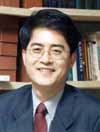[Opinion] The Desperate Need of Wisdom for Co-Existence
[Opinion] The Desperate Need of Wisdom for Co-Existence
Posted September. 19, 2001 08:37,

`A man dies if he starves.` These were the words of President Kim Young-Sam to a member of the Opposition Party who was fasting. Although it appears to be an obvious statement, its meaning becomes more significant with continuous reflection. However, this is not restricted to starvation. A man dies from lack of sleep. Every human beings are unified before this clear truth. There is no exception to the condition of creatures.
But human beings are creatures who think. Each has one`s own view and aspiration. Thus argument is inevitable. Conflicts arise continuously. The world cannot but be chaotic. Human beings lose ground when this fact is denied. Being same yet different, radiating common elements amidst differences are the fundamental tendencies of human existence.
Think about it. If the people of Cholla province use the same dialect as the people of Kyongsang province, and if the people of Kangwon province eat the same food as those of Jeju province, how dull would life be? If the entire 50 million population gather tightly around either of liberal or conservative ideologies, and for that reason think that it is not the name but the act that counts, and that any kind of unification between the North and the South will do as long as unification is effected, what is to become of our society? It is now time to abandon our self-portrait as `unitary nation, and history from time immemorial`. It is also time to quit thinking that strong ties can be built up by ordering, `the same for me` at a lunch place.
That hybrid multiplication produces more favorable results is evidenced through our life and it is directly applicable to culture. Diversity is a good thing. Difference is a natural thing between people, and heterogeneity is like a condiment that enriches and fulfills our life. However, we must think about the limit of difference. We must ask to what extent can a person differ from another. Human beings ought to be really different from one another. Difference is a beautiful thing. But the aesthetics of difference only shines beyond a certain point.
America`s world-renowned philosopher Michael Walzer is a Jew. According to him, it is understanding that makes difference possible. And difference requires understanding. This is a true statement. And he continues to say that understanding does not lack discernment. It is not, for example, like the phrase which goes, `whatever is good is good`. Only when certain regulations are imposed will one achieve true understanding. It is with such an understanding that we ought to respect differences.
Differences that deny or overlook respect towards life, longing for a worthy life as a human being, or universal commitment towards a democratic political order, are not differences. It is nothing more than a blind destruction. It is no other than nihilism wrapped with diversity. We must be cautious of this.
The skyscraper of New York collapsed like a flash. This terrible disaster carries a sincere message to humanity. The hijacked plane that crashed into the twin tower of the World Trade Center was an outright expression of current differences, conflicts, and hatred. It was a tragic incident that reminded us of the need for a peaceful co-existence between different ideas, religions, and patterns of life. It is also a reminder for the urgent need to discover the minimum norm and order that could enable co-existence.
We are no exception. The aesthetics of difference and the wisdom of co-existence, we must hasten with such dangerous feats. These are not something we could avoid. We must recognize the current state of culture. We must no longer ignore the splinters of crisis that seeps through the impregnable fortress of this unitary nation, where only the mainstream exists, and any idea, symbol, or ideology that deviates from the mainstream cannot find its ground..
We must provide the ground on which the non-mainstream can stand. We must ditch the false notion of one mind and one desire. At the same time, we must form the political philosophical norm and the systematical framework that enable the co-existence of the mainstream and the non-mainstream.
We are simply sitting back before such a life-and-death task. We are wavering before a law of contradiction that seems to demand us to go eastward and westward at the same time. It is not only the skyscraper that is collapsing. The warning bell is also ringing in our society. This is what frustrates me.
Seo Byung-Hoon (Professor of Politics, Soong-Shil University)
Headline News
- Joint investigation headquarters asks Yoon to appear at the investigation office
- KDIC colonel: Cable ties and hoods to control NEC staff were prepared
- Results of real estate development diverged by accessibility to Gangnam
- New budget proposal reflecting Trump’s demand rejected
- Son Heung-min scores winning corner kick







